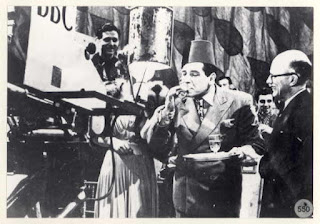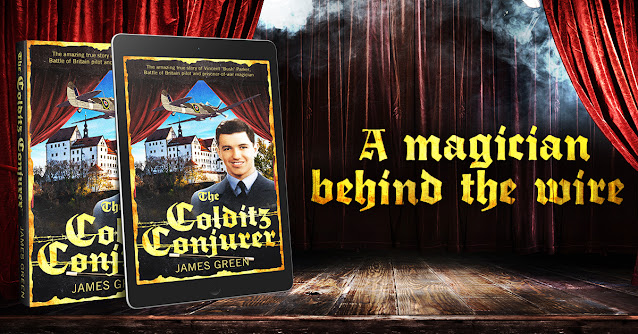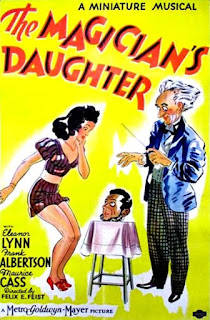"Don't be fright!": radio magician's catchphrase helps reassure the nation
Sirdani was the most popular magician to entertain on British radio during World War Two. Over the airwaves, he entertained millions of people, bringing light relief to dark times.
Although he played the role of an Egyptian gilly-gilly man, Sirdani's real name was Sid Daniels. He was born in Mile End, London in 1899. World War One broke out when Daniels was 16 years old. Like many others, he enlisted by falsifying his age. He went on to serve in three campaigns, in West Africa, German East Africa and France.
A keen amateur magician, Daniels used to mystify his fellow soldiers in the trenches with his tricks. It was when shells came whining over just as he was in the middle of a particularly interesting bit of magic that he originated his famous phrase, "Don't be fright".
After his discharge from the army, Daniels took up magic full-time. He adopted the name Sirdani and the persona of an Egyptian gilly-gilly man. Early in his career he performed Yogi type effects, walking on glass, needle through skin, eating glass and records.

Sirdani (1945)
(Source: British Film Institute)
In the 1930s, he firmly established himself as a comedy character magician and performed more regular magic tricks and pickpocket routines, using pidgin English patter. Like Tommy Cooper, who developed his act during the war years, Sirdani often wore an Egyptian fez. He toured overseas and appeared, as himself, in several film shorts for British Pathe. A short review of his act during a tour of India read, "Small stuff but nicely put over. A good entertainer and a perfect showman."
British Pathe. What the Public Wants! (Reel 1 of 4)
(Source: British Pathe) (start from 3.40 mins)
During World War Two, Sirdani was the most popular magician to entertain on the radio. He featured on dozens of editions of the popular Navy Mixture programme on the B.B.C.’s General Forces Programme service, which was broadcast at home and overseas.
His catchphrase "Don't be fright!" (short for "don't be frightened" and typically used when he was asking an audience member to help him with a trick) became a household phrase. When someone was scared, perhaps because of an impending air raid or military operation, the phrase "Don't be fright!" was often uttered by a family member, friend or colleague.
In the shows Sirdani would perform simple tricks to spectators in the radio studio, then teach the audience at home how to do the tricks themselves (to protests from British magical societies). Given the prominence of the B.B.C., these broadcasts went all over the world and were heard by millions of people.
It seems incredible that conjuring, the most visual of entertainments, should be a success on the air, but for many months Sirdani appeared on Navy Mixture with increasing success. He pulled it off with a mix of comic malapropisms and catchphrases covering for the lack of visuals.
A 1945 edition of The Billboard reported that “Sardini [sic] “the radio trickster” is beating records by broadcasting comedy and conjuring tricks over the air four times weekly”.
He later wrote-up the tricks taught during the Navy Mixture shows into a book, called Don't Be Fright (1946).
Sirdani. Don't Be Fright - Radio Magic by Sirdani (1946)
(Source: Author's collection)
"I can remember, as a small boy, crouching on the stairs outside the living room desperately trying to write down his explanations as to how he did the tricks," recalled variety performer and historian Roy Hudd, in Roy Hudd's Cavalcade of Variety Acts (1997).
In August 1945, in a new angle in radio-magic, Sirdani performed an international magic trick, for the B.B.C.’s Atlantic Spotlight, a weekly broadcast to America. A pack of playing cards was held on both sides of the Atlantic, without previous arrangement, or sight. Sirdani named each card selected in New York and London. The Conjurors’ Magazine, described the effect as, “a most novel form of radio-magic, something new and interesting”.
Sirdani didn't just appear on radio during the war. He toured British theatres and was particularly popular, as audiences were keen to see the magician they had only heard on the radio in real-life.

New Cross Empire Programme featuring Sirdani, 13 September 1943
(Source: Author's collection)
He was also a regular performer at the London version of the Stage Door Canteen. This was an entertainment venue for U.S. service personnel at Piccadilly Circus in central London. Dancing, entertainment, food and non-alcoholic drinks were provided free, and often served by celebrities. Performers offered their services for no fee.
(Source: Author's collection)
Post-war, Sirdani continued to be a success. In 1945, he was even hired to make a T.V. advert for the household cleaning product Vim (watch it here). A constant hit on the variety theatre circuit for many years, Sirdani also made several T.V. appearances. These included Variety, Cafe Continental, Music Hall, Kaleidoscope, and Frost on Saturday. In 1948, in a quirky format, he also supposedly presented a show where amateur magicians with nobility titles (lords and dukes) performed their tricks for the cameras.
Advertisement for Sirdani in a post-war theatrical publication (1945).
(Source: Author's collection)
Brother of the drummer and bandleader, Joe Daniels (Joe Daniels and his Hot Shots), Sirdani was assisted in later life by his wife, who at one time, was a magician in her own right.
In World War One, Sirdani fought for his country. In World War Two, he kept it entertained.
He died in 1982, aged 82.
Related article: Magic over the airwaves, a blog about magicians appearing on the radio during World War Two, including Sirdani. Blog link.
Related article: Entertaining Hitler: Gogia Pasha, the gilly-gilly man (and war worker), a blog about another wartime gilly-gilly man, Gogia Pasha. Blog link.
*** AVAILABLE NOW ***
The Colditz Conjurer tells the amazing true story of Flight Lieutenant Vincent ‘Bush’ Parker, Battle of Britain pilot and prisoner-of-war magician.
Written by the Magic at War team, The Colditz Conjurer is a remarkable tale of perseverance, courage and cunning in the face of adversity. It features over 55 original photographs and maps. 126 pages.











Comments
Post a Comment